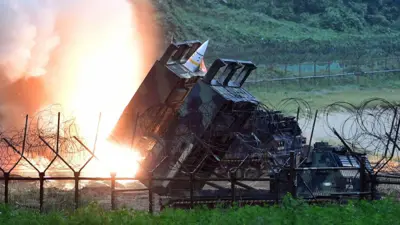We've updated our Privacy and Cookies Policy
We've made some important changes to our Privacy and Cookies Policy and we want you to know what this means for you and your data.
US-China trade talks resume amid diplomatic tension
Image source, AFP
China and the US resumed trade talks in Washington on Thursday against a backdrop of heightened diplomatic tension.
This week the US government blacklisted 28 Chinese entities it said were "implicated" in human rights abuses.
The US also imposed additional visa restrictions for Chinese government officials.
Without progress, the US plans to raise tariffs on $250bn worth of Chinese goods from 25% to 30% next Tuesday.
As the first day came to a close, US President Donald Trump said the talks had gone well. He is expected to meet with Vice Premier Liu He on Friday.
But the recent diplomatic disagreement could complicate the negotiations.
Although many of the blacklisted entities are government security bureaus, the eight companies named include some of China's leaders in artificial intelligence.
The blacklist could restrict the access of those companies to US microchips, which they currently rely on for many of their products and services.
The Chinese Embassy in Washington has denounced the visa action and said the US accusations on human rights violations were "made-up pretexts" for interfering in China's affairs.
Image source, AFP/Getty
US officials have vowed to keep pushing Beijing over its massive security operation in Xinjiang, in China's far west.
"We're going to continue to talk about these human rights violations," the US Secretary of State, Mike Pompeo, told PBS.
The US Department of Commerce alleges the blacklisted entities are involved in "repression, mass arbitrary detention, and high-technology surveillance".
Human rights groups and the UN say China has rounded up and detained more than a million Uighurs and other mostly Muslim minorities in detention camps.
China insists they're "vocational training centres" aimed at preventing terrorism, promoting integration into Chinese society and providing employment.
Low expectations
The US and China have been locked in a long-running trade spat over a variety of thorny issues.
The US has been demanding better protection for US intellectual property, and an end to both cyber theft and the forced transfer of technology to Chinese firms.
It also wants China to reduce industrial subsidies and improve access to Chinese markets to US companies.
These talks are the first minister-level negotiations in more than two months.
Many trade experts have low expectations for the talks, suggesting an interim deal might be possible, while a major agreement is unlikely.
"I think both sides have an impetus to get to that table. The question is whether there can be a mini-deal that comes out of it. Certainly nothing comprehensive," said Sherry Madera, a former Minister-Counsellor at the British Embassy in Beijing.
Former Deputy Assistant US Trade Representative Matt Gold said that if the talks went well, China might make additional agricultural purchases and the US might push back its planned tariff hike.
But he said neither Chinese President Xi Jinping nor US President Donald Trump seem to think ending their trade dispute is urgent.
For Mr Trump, it is an issue he can use in the upcoming Presidential election, while for Mr Xi, it's a waiting game, Mr Gold said.
"He wants to see Donald Trump fail and he's willing to dig in his heels to make it happen."
Top Stories
More to explore
Most read
Content is not available








